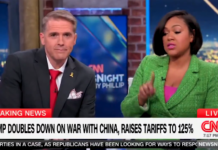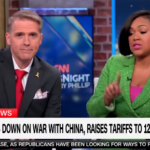It looks like Volodymyr Zelensky had to eat a little crow after his Oval Office outburst. Days after that heated confrontation with President Trump and Vice President JD Vance, we now hear that Ukraine’s president sent an apology letter, according to U.S. special envoy Steve Witkoff.
But here’s the kicker: Trump didn’t even mention an apology when he publicly announced that he received a letter last week. And if you ask Zelensky’s own people, they insist he never apologized at all. So, what’s the real story here?
Let’s back up. When Zelensky showed up in Washington, he apparently thought he was still dealing with the Biden administration—a White House that handed over blank checks while mumbling something about “democracy.” Instead, he got a lesson in what a real negotiation looks like.
When Trump and Vance pushed for diplomacy, Zelensky dug in his heels, unwilling to entertain the idea of negotiating with Russia. That went over about as well as a lead balloon, and next thing you know, he was shown the door. Not exactly the diplomatic victory he was hoping for.
Then there’s the minerals deal, which was supposed to be a key part of Ukraine’s relationship with the U.S. Trump, the businessman that he is, wasn’t about to sign anything without proof that Zelensky was serious about ending the war. And let’s be honest—why should the U.S. keep throwing money and resources at Ukraine if its leadership is stubbornly refusing to consider realistic pathways to peace? It’s not rocket science: you want continued support, you’d better show you’re willing to negotiate. That’s how deals work.

Now, let’s talk about the intelligence-sharing pause. It’s almost comical that after years of hearing how vital U.S. military aid is to Ukraine’s survival, the minute Trump starts playing hardball, the same people suddenly want to act like it’s no big deal. Witkoff tried to downplay it, saying intelligence-sharing wasn’t completely “shut off”—but make no mistake, the pressure is on. Trump knows how to negotiate from a position of strength, and right now, Ukraine is being reminded that the U.S. is not an unlimited piggy bank.
And then, of course, there’s Russia. Trump’s made it crystal clear that he’s not afraid to slap massive sanctions and tariffs on Moscow if necessary. But here’s the part the media doesn’t want to talk about: he’s also made it clear that Ukraine doesn’t have as many bargaining chips as it thinks. The reality is, Ukraine needs American support more than America needs Ukraine. And Trump, unlike the previous administration, isn’t interested in writing checks just to feel good about “defending democracy.”
Zelenskyy sent a letter apologizing for the incident in the Oval Office? Cute. But apologies don’t pay back the billions we sent, and they sure as hell don’t change the fact that we’re done funding his war. No more blank checks.
pic.twitter.com/FBztEhXXKm
— Desiree (@DesireeAmerica4) March 10, 2025
This is classic Trump—negotiating from strength, refusing to be played, and making it clear that American interests come first. Ukraine can bluster all it wants, but the facts remain: if Zelensky wants continued U.S. support, he’d better start showing he’s serious about peace. Otherwise, he may find that Trump’s patience—like his willingness to fund endless foreign wars—is wearing thin.








